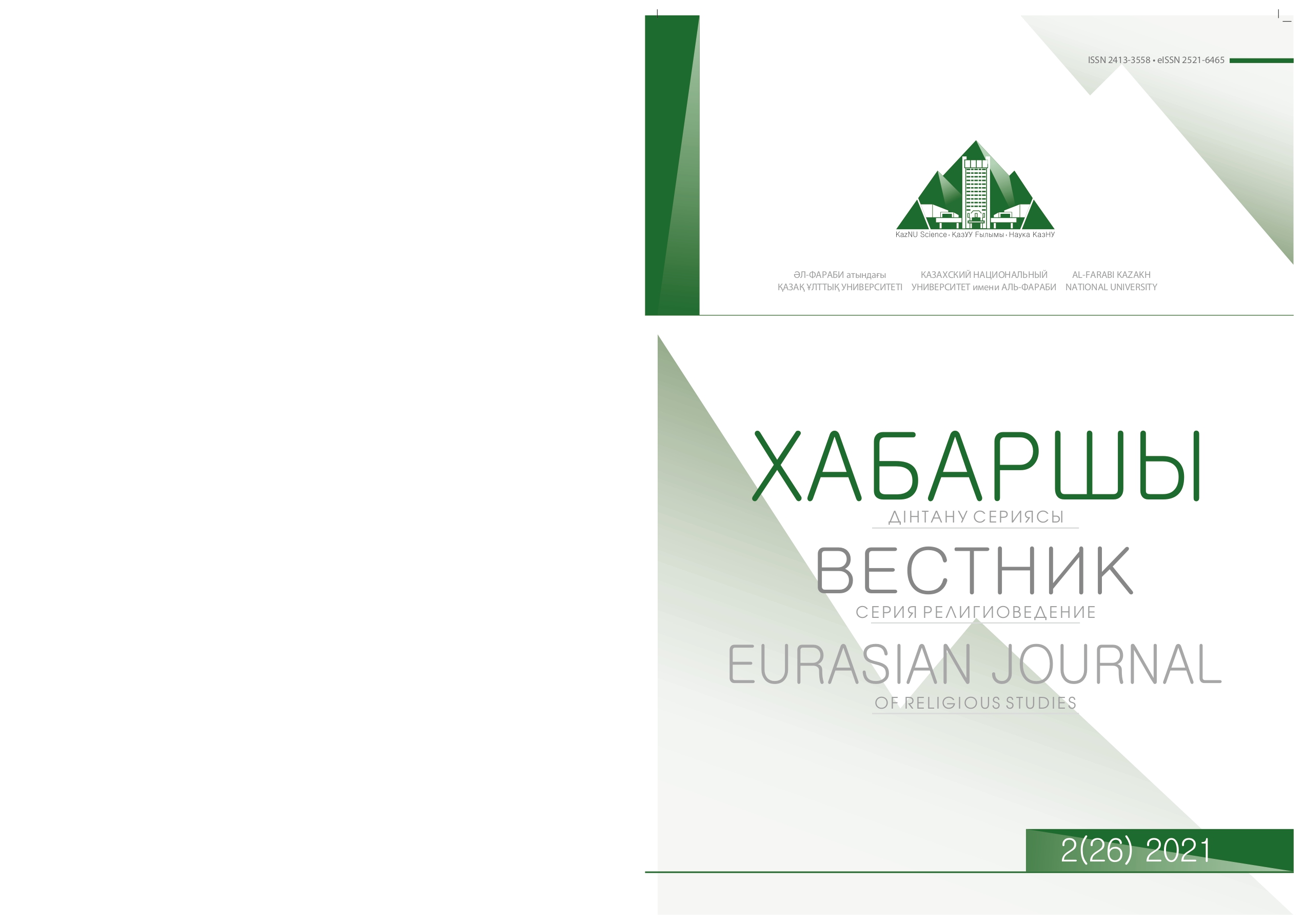The role of sacred places in Kazakhstan in strengthening the national code
DOI:
https://doi.org/10.26577//EJRS.2021.v26.i2.r6Keywords:
sacred place, national code, national identity, spiritual revival, cultural memoryAbstract
Today, due to the relevance of the state program of spiritual revival in the country, the sacred places of Kazakhstan are studied comprehensively.This article examines the role of sacred places in Kazakhstan in strengthening the national code.It will also show the role and place of the sacred places of Kazakhstan in strengthening and preserving national identity.Due to the fact that today the state program of spiritual modernization is relevant in the country, this article is one of the main steps in the study of sacred places in Kazakhstan.
The research work «the role of Kazakhstan's sacred places in strengthening the national code» is aimed at a comprehensive study of sacred places and places in the Kazakh steppes to show the world and people that we have not only a great land, but also a rich historical and spiritual heritage.In the article, special attention is paid to the fact that Holy places are not only a sign of religion, but also a means of forming the national identity of the state, popularizing and displaying our culture and traditions.The territory of Kazakhstan is rich in shrines and sacred places. This can be considered as one of the forms of forming the national identity of the people and as a means of forming the popularity of the territory.In this context, work on the modernization of consciousness should be based on cultural memory, symbolic, sacred and cultural-historical things. Sacred places or spiritual shrines are the backbone of the spiritual tradition of the people.
Кеу words: sacred place, national code, national identity, spiritual revival, cultural memory
References
Satershinov B.M., Sagikyzy A. Synthesis of traditional and Islamic values in Kazakhstan // European Journal of Science and Theology. – Romania: «Ecozone Publishing House», – 2015. – Vol. 11, Issue 5. – 217-229.
Бакина Н. История культуры тюрков. – Алматы: «Дайк-Пресс», 2006. – 480.
Грэссе Р. Империя степей. – Алматы: «Санат», 2006. – 304.
Кекілбаев Ә. Маңғыстау энциклопедиясы. – Алматы: «Атамұра», 2008. – 690.
Нұрғалиев Р.Н. Абай. Энциклопедия. – Алматы: «Атамұра», 1995. – 294.
Нұрмұратов С. Е. Рухани құндылықтар әлемі: әлеуметтік философиялық талдау. – Алматы: «Ғылым», 2000. – 123.
Нысанбаев Ә.Н. Қазақстан Ұлттық энциклопедия. – Алматы: «Аруна», 1998. – 524.
1 Асқар Л., Аташ Б. Ұлттық код деген не? https://old2.aikyn.kz/2018/05/11/52268.html 11.05.2018.
2 Назарбаев Н. Болашаққа бағдар: рухани жаңғыру. https://aikyn.kz/2017/04/13/9894.html 16.04.2017.
3 Мырзахметұлы М. Абайтану – ХХІ ғасыр көгінде. https://abai.kz/post/41056. 27.06.2015.
4 Мұхамадиев Д. Абай дүниетанымындағы «ұлттық код» концепциясы. https://sarbaz.kz/volno/abay-duenietanymyndaghy-ulttyq-kod-kontseptsiyasy-172151621. 04.08.2017.
5 Төленова З.М. Қазақстанның киелі жерлерінің географиясы – қоғамның рухани жаңғыруының факторы. http://e–history.kz/kz/publications/view/3149. 11.05.2017.
6 Бигожин У. В Кaзaхстaне сейчaс идет бум святых мест. http://caa-network.org/archives/5947. 05.11.2015.
References
Bakïna N. (2006) Ïstorïya kwltwrı tyurkov [The history of Culture of Turks]. – Almatı: «Daık-Press». – 480.
Gabitov T., Tolen Z., Mantayeva T., Alimzhanova A. (2016) Rol' vydajushhihsja lichnostej v kazahstanskom obshhestve: sravnitel'nyj analiz tradicionnoj social'noj kul'tury kazahov [The role of outstanding personalities in the Kazakh society: Comparative analysis of the Kazakh traditional social culture] // Anthropologist. – London: «Taylor & Francis journals». – Vol. 25, Issue 1-2. – 95-102.
Grésse R. (2006) Ïmperïya stepey [The Steppe Empire]. – Almatı: «Sanat». – 304.
Kekilbaev Ä. (2008) Mañğıstaw éncïklopedïyası [The Encyclopedy of Mangystau]. – Almatı: «Atamura». – 690.
Nısanbaev Ä.N. (1998) Qazaqstan Ulttıq éncïklopedïyasy [The National Encyclopedy of Kazakhstan]. – Almatı: «Aruna». – 524.
Nurğaliev R.N. (1995) Abay. Enciklopediya [Abay. The Encyclopedy]. – Almatı: Atamura. – 294.
Nurmuratov S. E. (2000) Rwxanï qundılıqtar älemi: älewmettik fïlosofïyalıq taldaw [The world of spiritual values: social philosophical analysis]. – Almatı: «Gılım». – 123.
Satershinov B.M., Sagikyzy A. (2015) Synthesis of traditional and Islamic values in Kazakhstan // European Journal of Science and Theology [Sintez tradicionnyh i islamskih cennostej v Kazahstane // Evropejskij zhurnal nauki i teologii]. – Romania: «Ecozone Publishing House». – Vol. 11, Issue 5. – 217-229.
1. Asqar L., Atas B. Ulttıq kod degen ne? [What is the National Code?]. https://old2.aikyn.kz/2018/05/11/52268.html 11.05.2018.
2. Nazarbaev N. (2017) Bolaşaqqa bağdar: ruxani janğıru [Course towards the future: modernization of Kazakhstan’s identity]. https://aikyn.kz/2017/04/13/9894.html 16.04.2017.
3. Mırzaxmetulı M. ( 2015) Abaytanw – XXI ğasır köginde [Abai studies - in the sky of the XXI century]. https://abai.kz/post/41056. 27.06.2015.
4. Muxamadïev D. (2017) Abay dünietanımındağı «ulttıq kod» koncepciyası [The concept of "national code" in Abay's worldview]. https://sarbaz.kz/volno/abay-duenietanymyndaghy-ulttyq-kod-kontseptsiyasy-172151621. 04.08.2017.
5. Tölenova Z.M. (2017) Qazaqstannın kieli jerlerinin geografïyası – qoğamnıñ ruxani jañğırwınıñ faktorı [Geography of the holy places of Kazakhstan - a factor in the spiritual revival of society]. http://e–history.kz/kz/publications/view/3149. 11.05.2017.
6. Bigojin W. (2015) V Kazaxstane seyças idet bum svyatıx mest [There is a boom in the holy places in Kazakhstan now]. http://caa-network.org/archives/5947. 05.11.2015.













